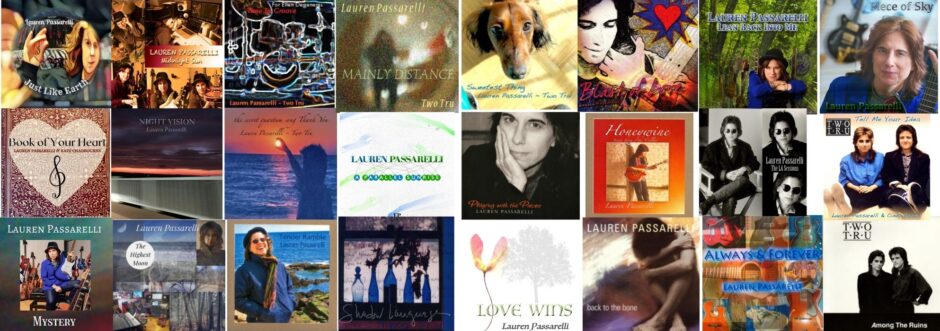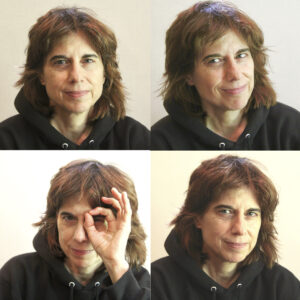L Pass Interview – by Alexandria Mulé
AM: When did you realize that you wanted to first put your material out into the world rather than keeping it for yourself?
LP: I wanted to make a record from when I started writing songs at 10 yrs old. I was recording at 11 yrs old and thinking, “There has to be a dream machine that can let me hear all the parts I hear in my head all together.” I was bouncing back and forth to two cassette decks when I was 16, got a Teac reel to reel when I was 17. I knew I was writing way too many songs to pay for studio time. I wanted to be able to play with sound. I put my first recording out in 1989, everybody was still making lp records, but I was advised from a friend to release a CD. I recorded it on a half inch 8 tk reel to reel. I just love getting the songs into a finished tangible form and it’s so cool that technology has made it so easy and cost effective to get music out into the world now.
AM: Did you ever organize tours? What was that process like?
LP: It’s the same as booking one show. You just book more and if they take you too far from home, book a place to stay. Lots of ph wk. travel, and hoping people will keep their word, and pay you.
AM: Did you self-produce your projects? If not, how did you go about finding the right person to work with to achieve what you envisioned?
LP: Always self-produced, recorded and mixed, now mastering too. I did write to an LA producer who wrote back saying it was the best material he’d ever been sent via the mail and he produced four of my songs with me and shopped them. He got me a one song deal on a compilation album of new bands on a major label. It was a lot of fun.
AM: Were there any costs in the recording process the first time around that you didn’t account for that you wish you did going into it?
LP: I always rented more outboard gear to mix. That was expensive. I was encouraged to print more art work for the CDs and cassettes and 6 x 12 retail boxes that held the CDs (cause retailers didn’t want to change their rack furniture that were album size) that were in stores then. So although it saved printing costs, we didn’t sell through our CDs fast enough to need to order more CDs and cassettes to use the extra artwork. In those days it was very expensive to make a CD. There was one company that made the physical CD via a U-matic tape master that only mastering engineers could provide you with to submit to make the glass master. Another company in Canada did the artwork.
AM: How do you write without having in your mind the possible commercial success or lack thereof of your material? Can you?
LP: I’ve always written for me cause I wanted to hear the music in my head, I had something to say, I found some sounds interesting I wanted to play with, or I was intrigued by a groove. It never had anything to do with commercial success. Getting to play with magic was the thing. I still love writing and playing with recordings. It’s a gigantic blast. When I was in my twenties I noticed I nearly wrote a song a month one year. So I then did it on purpose. 12 songs a year that I loved. It would feel like pressure sometimes even though it was my own idea, and procrastination had me writing just making the deadline at the end of the month, sometimes before the month changed the very next day. I’d get that song in before midnight. I’d get so excited that I wrote a song, I’d write another one that same week. So then I was writing two songs a month, for years. I learned that creativity is a muscle and I could turn it on anytime I wanted to.
AM: Once your projects were done, what did you find to be the best marketing strategy?
LP: I used to write to recording magazines that reviewed writers tapes. I got a great review in “Home & Studio Recording Magazine” and “Roland Users Group Magazine” and publications like that. Years later when I started a label with a friend we hired a radio promoter and publicist, both very expensive even for then. I’ve always noticed that if I could physically be somewhere playing where there were people eager to hear new music, I always sold CDs. So live is still the best ’cause people in that moment want to take a piece of the good feeling home. So they buy.
AM: What advice would you give to an artist trying to release music in this over saturated digital age where it’s difficult to set yourself apart?
LP: There are new books, strategies, classes, and youtube videos on everything anyone can do at anytime but do what you feel will be fun and exciting for YOU. You can waste a lot of time and money following some formula that worked for someone else but it’s all up to you and your energy. Nobody can keep you from success but you. It’s allowing yourself to be in the game that you need to learn. If you get a cool idea to write someone, or call, or show up, act on the fun impulse. Your gift makes room for you. No matter where you think you want to go, there is no get there. It’s finding a way to soothe yourself and enjoy your life as you go, that is the game. It’s learning how to make a fun ride, and enjoy fun people along the way, and pairing up with like-minded folks that want to create something together, and allowing yourself to have it. It’s learning how to enjoy what you’re doing for the sake of doing it. There’s no other reason to do it unless you love it.
LP: You already have so many aspects that set yourself apart. We’re all unique. You just need to tune into what are the best things about you that you want people to know, something you can share, something you enjoy doing or creating that you do well and do it wholeheartedly and savor who you are and what you know. When all that fun, and great music is what you’re about, it’s something everybody wants to be a part of, and have.
AM: What would be your biggest songwriting tip?
LP: Imagine you are your favorite artist, and write. Feel the greatness, feel the importance, feel the love you feel for them, and their work. Feel it for yourself, remember you’re a wizard, and use your magic.
AM: What were the biggest challenges you faced independently releasing your projects?
LP: In the early days, doubt, fear, money, competition.
AM: Going from a Berklee guitar student, to the first female guitar instructor, what have been your biggest struggles being a female in a male-dominated field?
LP: Berklee was a boys club when I was a student in 1978, and a new teacher in 1984. I was the only woman teacher in the guitar dept. for 6 or 7 years. I loved to play and I was playing 9 years with Bill Leavitt books before I even started at Berklee. I was well prepared in my classes and the boys would be more determined then to try to catch up to me. My colleagues were so many of my own teachers so a few put me down for being a songwriter, loving the beatles, playing a strat (where’s your jazz guitar?) or tried to emphasize that only men could REALLY play. But my track record was on a good foundation of let’s all just be our best selves, share what we love, and get on with it shall we? It gets better and better at Berklee every day since then. It’s an awesome gig. Out in the world I met promoters and producers who propositioned me for physical favors or they wouldn’t do anything for my career. I never did, and never worked with any of them. I would ask other women in the industry, “Is this really what I have to do to be taken seriously? How do I know they’ll keep their end of the bargain if I did? Is this what it’s really like?” They either dodged the question or laughed about how you have to handle the boys, one joked, “It’s not a problem that they’re asking, it’s a problem when they stop asking.”
LP: If you spend time dreading and wallowing in problems you only get more annoyed and deeper into the problem. So I got deeper into my music, learning new instruments, being a better recording engineer, keeping up with software and plugins, desiring to do the real stuff rather than feel thwarted by that stuff. Collect the pieces and play again. The fun and magic for me is the art itself. Compliments and money are wonderful. But the real reward is the music for me. It took me decades to learn this. When I respected myself more and took myself more seriously everybody else did, then came more compliments and more money. We want to connect, and feel like our lives, and work matter. But that’s something we have to cultivate in ourselves. We need to make meaning every day, feel satisfied with our time, use it well, follow what’s fun. When you connect with what you’re doing, it lights up, and becomes something people can’t ignore, it’s infused with your best which is the energy in all of us. We know what’s real, and we all respond to it. Plus, you get to be an expert in the things you love because you’ve spent decades at it.

